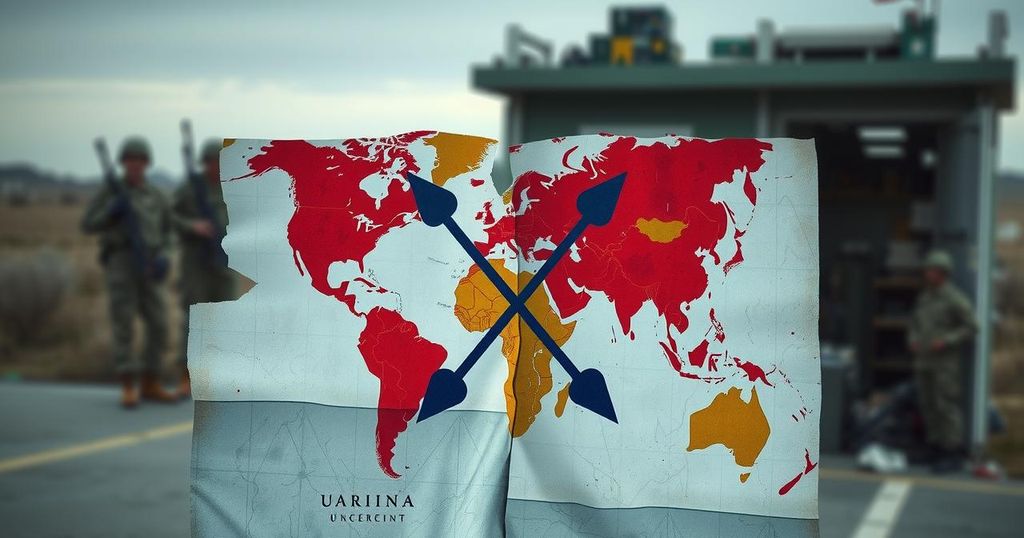The Kurdish-led SDF has stated they are unaware of U.S. plans to withdraw troops from Syria, raising concerns about ISIL’s possible resurgence. Reports suggest that the Trump administration is considering a troop withdrawal. The situation is further complicated by the recent ousting of President Assad and a meeting between Turkish President Erdogan and Syrian interim leader Al-Sharaa, indicating shifting regional dynamics.
The Kurdish-led Syrian Democratic Forces (SDF) have indicated that they have not been made aware of any plans for the withdrawal of United States troops from Syria. SDF spokesman Farhad Shami commented on the absence of communication regarding the purported plans, which were reported by U.S. media, raising concerns about the future of their collaboration with U.S. forces.
The SDF plays a pivotal role as a partner of the U.S.-led coalition against ISIL (ISIS) and controls a significant portion of northeastern Syria, encompassing around one-third of the country’s territory. Shami expressed concerns that if U.S. troops withdraw, it could provide an opportunity for ISIL and other hostile entities to regain influence in the region.
Reports from NBC News have cited unnamed Pentagon sources stating that the Trump administration is considering a troop withdrawal timeline of 30, 60, or 90 days. When asked about the potential withdrawal, President Trump remarked that the situation in Syria is complex and that the United States need not be involved in every regional conflict.
During his first term, President Trump revisited the idea of withdrawing troops from Syria but ultimately decided against it due to warnings from officials regarding the consequences for the anti-ISIL fight and the implications for Kurdish allies. The dynamics shifted again with the recent overthrow of President Bashar al-Assad, prompting renewed speculation about U.S. military presence in Syria.
In the aftermath of Assad’s ouster, the Biden administration reaffirmed its commitment to keeping U.S. forces in Syria to deter ISIL’s resurgence, particularly since approximately 2,000 U.S. troops remain stationed there, a notable increase from earlier deployments. This sustained military engagement is being scrutinized within the context of administrative changes and ongoing regional instability.
In light of these developments, the political landscape in Syria is evolving. The interim Syrian President Ahmed al-Sharaa recently met with Turkish President Recep Tayyip Erdogan, who has opposed Assad and supported rebel movements against him. Erdogan emphasized an enhanced Turkish role against ISIL and Kurdish forces, highlighting the tension surrounding Kurdish autonomy in Syria.
Al-Sharaa reiterated a commitment to collaborate with Turkey and stressed the need for unified governance in Syria while calling on the SDF to relinquish their weapons. His comments allude to the broader issues of territorial integrity and the military position of the SDF and allied groups under Turkey’s watchful eye.
This article discusses the uncertainties surrounding U.S. military plans in Syria, particularly regarding the withdrawal of troops and its implications for Kurdish alliances and the battle against ISIL. The Syrian Democratic Forces, a key ally of the United States in combating ISIL, have expressed concern over not being informed about any troop withdrawal plans. The geopolitical landscape has shifted following the recent fall of Syrian President Assad, and the ongoing tensions with Turkey regarding Kurdish groups underline the complexities of the situation.
The situation in Syria remains dynamic and fraught with uncertainty, particularly regarding the potential withdrawal of U.S. troops and the future role of the SDF. The interplay of local and international political interests will greatly influence the region’s stability and the fight against ISIL. The recent developments, including Turkish involvement and the new leadership under Ahmed al-Sharaa, mark a significant turning point that could redefine military alliances and governance in Syria.
Original Source: www.aljazeera.com






